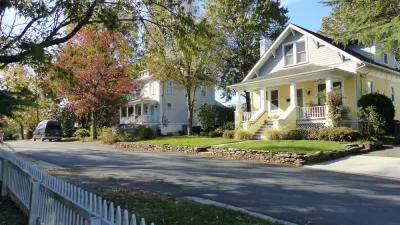Opinion: To undo the consequences (intended or not) of a built environment dominated by single-family zoning, more than just a few three-plexes and accessory dwelling units will be required.

"Long condemned for creating suburban sprawl and excluding Black Americans, immigrants, and low-income people from residential districts, [single-family zoning] has now come under attack for limiting the supply of affordable housing," according to an article by Alexander von Hoffman, senior research fellow in the Department of Urban Planning and Design at the Harvard Graduate School of Design.
The article provides a details history of the creation of single-family zoning and the current zoning and planning reform movements dismantling the status quo in cities like Minneapolis and states like Oregon.
The article concludes with a powerful statement on the limits of single-family zoning reform, adding a list of additional reforms Hoffman argues will be necessary to make progress against the challenges of the housing market and reversing the historic role of planning role in creating those challenges:
Merely eliminating single-family zoning, history suggests, is unlikely to increase housing stock significantly. To unleash residential development will require peeling back layers of regulations that have accrued over the decades. That could mean reducing minimum lot sizes, relaxing overly stringent construction and site requirements, easing design reviews, and rolling back some environmental controls, including certain provisions for wetlands and open space.
FULL STORY: SINGLE-FAMILY ZONING: CAN HISTORY BE REVERSED?

Maui's Vacation Rental Debate Turns Ugly
Verbal attacks, misinformation campaigns and fistfights plague a high-stakes debate to convert thousands of vacation rentals into long-term housing.

Planetizen Federal Action Tracker
A weekly monitor of how Trump’s orders and actions are impacting planners and planning in America.

In Urban Planning, AI Prompting Could be the New Design Thinking
Creativity has long been key to great urban design. What if we see AI as our new creative partner?

King County Supportive Housing Program Offers Hope for Unhoused Residents
The county is taking a ‘Housing First’ approach that prioritizes getting people into housing, then offering wraparound supportive services.

Researchers Use AI to Get Clearer Picture of US Housing
Analysts are using artificial intelligence to supercharge their research by allowing them to comb through data faster. Though these AI tools can be error prone, they save time and housing researchers are optimistic about the future.

Making Shared Micromobility More Inclusive
Cities and shared mobility system operators can do more to include people with disabilities in planning and operations, per a new report.
Urban Design for Planners 1: Software Tools
This six-course series explores essential urban design concepts using open source software and equips planners with the tools they need to participate fully in the urban design process.
Planning for Universal Design
Learn the tools for implementing Universal Design in planning regulations.
planning NEXT
Appalachian Highlands Housing Partners
Mpact (founded as Rail~Volution)
City of Camden Redevelopment Agency
City of Astoria
City of Portland
City of Laramie





























